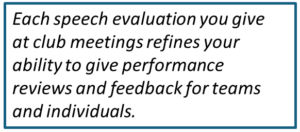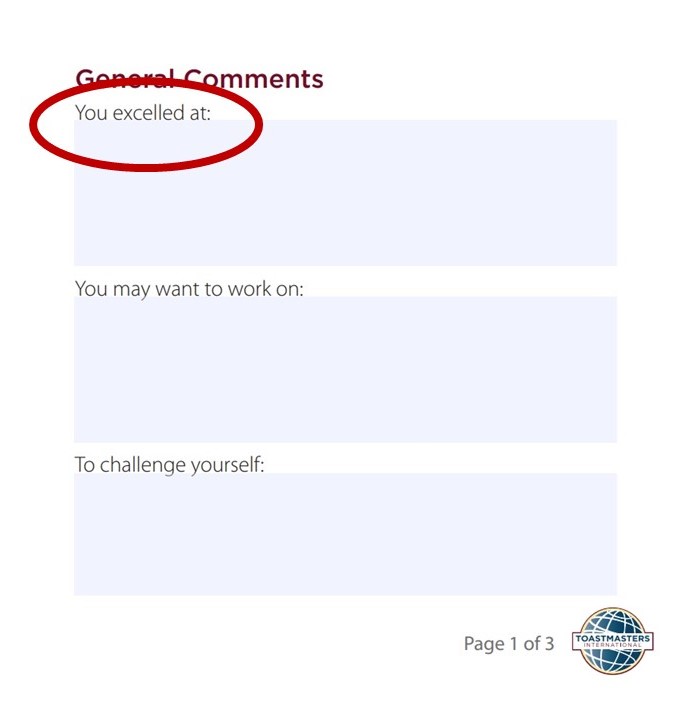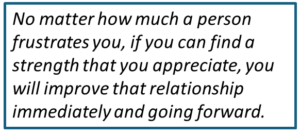“We should be thanking you.” Incorporating gratitude into speech evaluations helps you provide impactful workplace feedback and maximize your success.
When a novice Toastmaster closes a speech by thanking the audience, their speech evaluator will often say that speakers should not thank the audience because, “We should be thanking you.”
The evaluator is right. We should be thanking our speakers when we evaluate them. Speakers take the risk of going on stage to share something with us, their audience. We appreciate their bravery and often their message too. Thanking speakers is consistent with the Toastmasters Mission statement: “We provide a supportive and positive learning experience in which members are empowered to develop communication and leadership skills, resulting in greater self-confidence and personal growth.”
When you use gratitude in your feedback to speakers, you influence their next speech more powerfully. More importantly, developing this skill by practicing at club meetings benefits your professional success by:
- Improving your work productivity
- Increasing your job satisfaction

- Strengthening your work relationships
Each speech evaluation you give at club meetings refines your ability to give performance reviews and feedback for teams and individuals. The positive, immediate, and concise nature of Toastmasters speech evaluations prepares you to give brief, impactful feedback in your workplace.
Adding one piece of feedback – your gratitude – to your speech evaluations improves not only that specific delivery to your speaker, but also the daily feedback you provide in your workplace, growing your professional success.
Where gratitude fits in a speech evaluation
The first section on an evaluation form is the “You excelled at” section, where you note what you liked about someone’s speech. The Toastmasters Evaluation and Feedback training module promotes putting your feedback in the form of “I statements”

A Screenshot of the Toastmasters Evaluation Sheet © Toastmasters International
- “I liked how your body language described the tension in that moment”
- “I heard your frustration with the sales clerk”
- “I felt your excitement in your ah-ha moment”
Expressing gratitude at this point in your evaluation makes your feedback to speakers more effective.
- “Thank you for sharing your personal story with us. I liked how your body language…”
- “Thank you for sharing your experience at the department store. I heard your frustration…”
- “Thank you for sharing your life lesson with us. I felt your excitement in your ah-ha moment…”
When you include expressions of gratitude in your feedback, your listeners – be they speakers, team members, or colleagues – will receive your feedback more positively. They will become more likely to implement your suggestions. Expressing gratitude in the workplace achieves this success in the following three ways.
- Expressing gratitude improves your productivity
Most of us think of gratitude as a gift we offer others (you are thanking and recognizing them). Did you know it is also a gift to yourself?
Neuroscientists found that your mental health, executive function, cognitive processing, and ability to focus all improve when you express gratitude to others. People exercise, drink coffee, and take supplements to improve mental acuity. Sneaking expressions of gratitude into your feedback is cheaper, easier, and takes less time to create the same desired result. Expressing gratitude improves your performance. Moreover, leaders communicating gratitude to their teams improve both their own performance and that of their teams. The Wharton Business School found that when a leader started a shift by communicating gratitude to a call team, the team increased the number of calls they made on that shift and for weeks thereafter.
Starting feedback by communicating gratitude will improve your productivity and overall performance.
- Expressing gratitude improves your job satisfaction
Neuroscientists also found that expressing gratitude improves your level of satisfaction and joy with the work you are doing. The moment you communicate your gratitude to colleagues, the pleasure you find in your work immediately grows. Moreover, that impact lasts over time, sometimes taking months to titrate back down to your pre-expression level. Whatever work you are doing, communicating gratitude to others improves your level of satisfaction in two ways:
- You notice and appreciate the objective improvement in your performance
- Your pleasure in the specific task and general satisfaction with yourself and your circumstances increase
When you incorporate expressing gratitude into speech evaluations, you will enjoy giving your evaluation and feel better about it. When you incorporate expressing gratitude into your professional feedback, you will feel better about giving that feedback and your work in general.

photo credit: Toastmasters International
- Expressing gratitude improves your work relationships
In addition to the positive impact on your brain, expressing gratitude positively impacts the brain of the person receiving your gratitude. Brain chemistry and activity improve while you communicate your gratitude to others, impacting the limbic system where instinctive, subconscious opinions form. This positive impact on your brain and theirs improves the perception you each have of the other and builds trust in the relationship. Expressing gratitude in an evaluation makes you feel better about the person you are evaluating and visa versa. At work, you will feel better about your relationship with that colleague and they will feel better about their relationship with you.
These improvements to relationships seem intuitive; when you express gratitude, you are finding something you appreciate about that person and that person is feeling appreciated by you. No matter how much a person frustrates you, if you can find a strength that you appreciate, you will improve that relationship immediately and going forward. Finding value in a colleague you otherwise do not like improves how you work together. Making a habit of expressing gratitude forces you to practice:
- Finding and appreciating something positive in that relationship
- Encouraging that person to build on their strengths
- Helping that person see you more positively
Expressing gratitude in evaluations develops your ability to positively impact brain chemistry and activity. In your workplace, expressing gratitude makes others more likely to support your goals, efforts, and requests, making them more collaborative with you.
Incorporate gratitude easily into speech evaluations and other feedback
Adding one sentence adds only a few seconds to your evaluation: “Thank you for sharing… [your story, your experience, this recipe].
This change frames all of the positive comments more positively, creating these neuroscientific benefits. The rest of your feedback, including your suggestions, are also received more positively and are more likely to be implemented. Speech evaluations develop this skill and make it a habit that carries to your workplace.
Conclusion
Including gratitude in your Toastmasters speech evaluations furthers the now 100-year-old mission of providing supportive, positive learning experiences in clubs. When giving a speech evaluation, learn to incorporate a thank you into your opening, noting specifically what you enjoyed about the speech and why you enjoyed it. This description of your gratitude will improve your brain chemistry and activity as well as that of the person listening to you, improving your relationship, your effectiveness at giving feedback, and your overall joy. By practicing at club meetings, you will master giving professional feedback that changes behavior and builds relationships. That’s a win.
Megan G. Mayer, DTM, Naval Postgraduate School Toastmasters Club